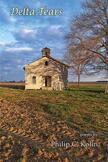Review: Ecotheological river poetry and the funk-loving Jesus of the Deep South
At its best, poetry is like prayer; it is an act of contemplation. Delta Tears, a stunning new book of poetry by Philip C. Kolin about the Mississippi Delta and its tragic history, reads like the fruit of a lifetime of contemplation, of acute attention to the echoes of history and eternity in the natural world, of the recognition of glimmers of grace that cut through the dark.
A distinguished emeritus professor of English and emeritus editor of The Southern Quarterly at the University of Mississippi, Kolin has called Mississippi home for over 40 years. Building on previous collections, like Reaching Forever and Emmett Till in Different States, the poems in Delta Tears blend ecotheology and Scripture with pleas for social justice. In this light, the Mississippi Delta emerges as not only a meeting place of different states, but as a place where history converges with the current moment. Immanent reality touches the transcendent, and trauma and redemption are inextricably intertwined.
The opening poem describes the Mississippi River as “part corpse, part redemption.” The river winds its way through each of the book’s six sections, each poem a communion of salvation and sacrifice: “the taste of trees [that] flourished on this land” is inseparable from the Black bodies “bludgeoned and betrayed,” hung from tree limbs and buried in “the longest tear duct in America.”
In the book’s first section, “That Old River,” the ancient voice of the Mississippi echoes Christ’s “before Abraham was, I am”:
I am the Father of Rivers
geology’s darling
millennia flow through my kingdom.
Section two, “Centuries of Tears,” chronicles in painful detail the history of slavery and sharecropping. The cries of Exodus and Isaiah mix with those of the Middle Passage and Parchman Prison.
In Delta Tears, the Mississippi Delta emerges as not only a meeting place of different states, but as a place where history converges with the current moment.
Kolin seeks lighter notes of hopeful lyricism in the rhythms of the seasons and the blues. Pain is alleviated by the hope of “a prophet’s promise/ of fertility, a season’s renewal,” and in musical sanctuaries “where you meet the funk-loving Jesus,/ scoffing at that sign that says ‘Negroes and dogs not allowed.’”
History’s pilgrimage toward redemption culminates in the final poem, “Mary, Mother of the Delta.” This shrine of healing is an image of Delta Tears itself: a space of confession, reparation and contemplation of “a new baptism and spirit and place.” This collectionis a brilliant companion as we move out of the Easter season into life anew.
This article also appeared in print, under the headline “Sin and salvation in verse,” in the May 2021, issue.









